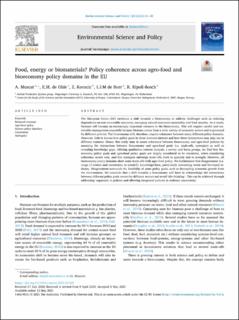Food, energy or biomaterials? Policy coherence across agro-food and bioeconomy policy domains in the EU
Journal article, Peer reviewed
Published version

Åpne
Permanent lenke
https://hdl.handle.net/11250/2986120Utgivelsesdato
2021Metadata
Vis full innførselSamlinger
Sammendrag
The European Union (EU) envisions a shift towards a bioeconomy to address challenges such as reducing dependence on non-renewable resources, managing natural resources sustainably and food security. As a result, biomass will become an increasingly important resource in the bioeconomy. This will require careful and sustainable management especially because biomass comes from a wide variety of economic sectors and is governed by different policies. The bioeconomy will, therefore, require coherence between many different policy domains. However, little is known how policy goals in these domains interact and how these interactions may play out in different contexts. Hence, this study aims to assess coherence between bioeconomy and agro-food policies by assessing the interactions between bioeconomy and agro-food goals (i.e. trade-offs, synergies) as well as revealing knowledge gaps. Utilising qualitative content analysis, a survey and focus groups, we find that bioeconomy policy goals and agro-food policy goals are largely considered to be consistent, when considering coherence scores only, and that synergies outweigh trade-offs, both in quantity and in strength. However, all bioeconomy policy domains show some trade-offs with agro-food policy. We furthermore find disagreement (i.e. range of scores) and uncertainty in scientific knowledge-base, particularly concerning waste and bio-based industry. Disagreement surrounds the feasibility of some policy goals, such as decoupling economic growth from the environment. We conclude that a shift towards a bioeconomy will have to acknowledge the interactions between different policy goals across the different sectors and avoid ‘silo-thinking’. This can be achieved through addressing vagueness in policies and allowing integrated policies to embrace uncertainty.
